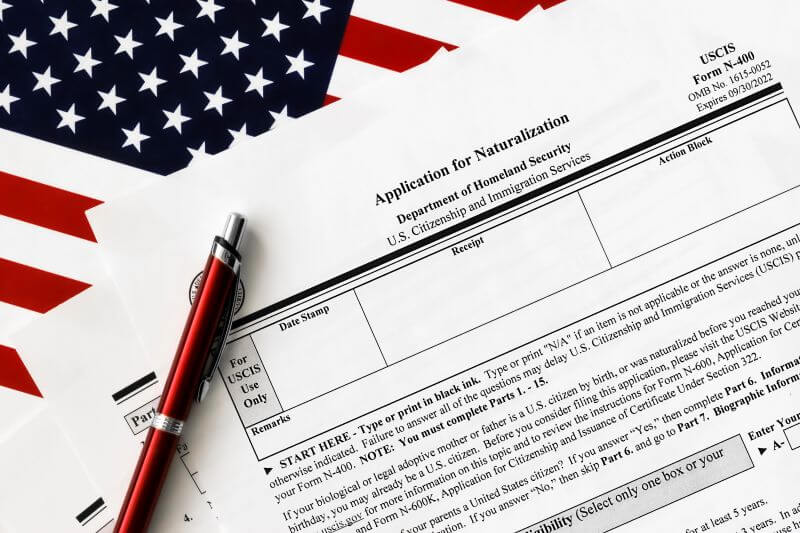A Houston Citizenship Attorney Helps You Achieve Your Goals
Summary:
U.S. citizenship offers security, rights, and full participation in civic life. Whether through naturalization, military service, or derivative status, a Houston citizenship attorney can help you meet eligibility requirements, file Form N-400, and navigate the process, from biometrics to the Oath of Allegiance. Legal support reduces delays, addresses complications, and helps you take this life-changing step with confidence.

Becoming a U.S. citizen is one of the most meaningful steps an immigrant can take. It provides a sense of belonging, opens the door to new rights and freedoms, and offers long-term security in the country you’ve chosen to call home. Whether you’re pursuing citizenship to reunite with loved ones, expand your opportunities, or solidify your future, working with a Houston citizenship lawyer can give you the guidance and clarity you need to move forward with confidence.
If you’re a lawful permanent resident thinking about naturalization but feeling unsure where to begin, you’re not alone. The process can feel intimidating, but with the right information and support, it becomes manageable. In this guide, you’ll learn about different ways to obtain U.S. citizenship, what each path involves, and how to avoid common roadblocks along the way.
How Can You Become A U.S. Citizen?
U.S. citizenship grants full legal rights and responsibilities, including the ability to vote, petition family members, and obtain a U.S. passport. Many immigrants pursue this status to gain stability, expand opportunity, and participate more fully in civic life. There are several pathways to citizenship, and each has its own rules and steps.
Birthright Citizenship
The U.S. Constitution follows the principle of jus soli, which means that anyone born on U.S. soil, regardless of their parents’ immigration status, is automatically a U.S. citizen. This includes all 50 states and U.S. territories like Puerto Rico, Guam, and the U.S. Virgin Islands.
Children born abroad may also acquire citizenship through their parents under jus sanguinis, or “right of blood.” At least one parent must be a U.S. citizen at the time of the child’s birth and meet certain physical presence requirements. To formalize the child’s status, parents must file a Consular Report of Birth Abroad (CRBA) through a U.S. embassy or consulate.
Naturalization
Naturalization is the most common pathway for immigrants who’ve already become lawful permanent residents (Green Card holders). To qualify, applicants must meet requirements such as maintaining permanent resident status, demonstrating good moral character, and passing an English and civics exam.
The process starts with Form N-400, the Application for Naturalization. After submission, applicants attend a biometrics appointment, complete an interview with a USCIS officer, and, if approved, take the Oath of Allegiance. With citizenship, you gain full protection under the law and a permanent home in the U.S.
Citizenship Through Adoption
Under the Child Citizenship Act of 2000, children adopted by U.S. citizen parents may automatically gain citizenship, provided they meet specific conditions:
- The child is under 18 years old.
- The adoption is finalized.
- The child resides in the U.S. with the U.S. citizen parent.
It’s essential to secure documentation such as a Certificate of Citizenship or a U.S. passport to prove status. Without these, children may face future complications when applying for benefits, jobs, or legal identification.
Military Service
Serving in the U.S. military opens a unique and often expedited path to citizenship. Active-duty service members, reservists, and qualifying veterans may benefit from waived residency requirements and faster processing.
Military applicants file Form N-400 like others, but often receive special consideration due to their service. Veterans who served during designated conflict periods may even qualify without fulfilling the typical continuous residency requirement. Reduced fees and prioritized review are also common.
Derivative Or Acquired Citizenship
Children may acquire or derive citizenship automatically when at least one parent naturalizes before the child turns 18, provided the child is a lawful permanent resident and lives with the parent in the U.S. This process doesn’t require a separate naturalization application. Still, it does require proof through official documents like a Certificate of Citizenship.
Obtaining these records early prevents future complications and allows children to access all the benefits of citizenship from the beginning.
Why Should You Secure Your Place In The U.S. For Good?
Becoming brings about the peace of knowing you belong. When you naturalize, you gain access to vital rights and protections that non-citizens don’t enjoy. Here are just a few key benefits:
- Protection from Deportation: U.S. citizens cannot be deported, even if they face legal issues in the future.
- Voting Rights: Only citizens can vote in federal elections, giving you a voice in the democratic process.
- Family Sponsorship: Citizens can petition for a broader group of relatives, and often benefit from shorter wait times.
- Federal Benefits: Many government programs, scholarships, and financial aid opportunities are only open to U.S. citizens.
- Freedom to Travel: With a U.S. passport, you can travel to many countries visa-free and receive support from U.S. embassies abroad.
- Expanded Career Opportunities: Citizens can apply for federal jobs, hold public office, and pursue positions that require security clearance.
While permanent residency offers stability, citizenship gives you the full rights and protections under U.S. law. If you qualify, there’s no better way to secure your long-term future.
Who Is Eligible To Apply For Naturalization?
Before you begin the process, you’ll need to meet several key eligibility criteria. These are the main factors USCIS looks for:
Age Requirement
You must be at least 18 years old to apply for naturalization using Form N-400. If you’re under 18, you may still become a citizen through your parent’s naturalization under the rules for derivative citizenship.
Residency Requirement
Most applicants must have lived in the U.S. as a lawful permanent resident for at least five years. If you’re married to a U.S. citizen and living together, the requirement may drop to three years.
Continuous Residence
Continuous residence means you’ve maintained a consistent presence in the U.S. without long trips abroad. Travel lasting more than six months can disrupt your eligibility unless you provide strong evidence that you didn’t abandon your residency.
Good Moral Character
USCIS evaluates your character over the required residency period. This includes paying taxes, avoiding criminal activity, and being honest in all dealings with immigration authorities. Convictions for crimes like fraud or violence may result in a denial.
English & Civics Knowledge
Most applicants must demonstrate an ability to read, write, and speak basic English and pass a civics test on U.S. history and government. USCIS offers accommodations for older applicants and those with qualifying medical conditions.
Meeting these requirements is the foundation of a successful naturalization case. If any part of your background raises questions, a Houston citizenship attorney can help you identify and address concerns early.
What Are The Key Steps To Gaining U.S. Citizenship?
The naturalization process involves multiple steps that must be completed accurately and on time. Here’s what the journey looks like from start to finish:
1. Determine Eligibility
Confirm that you meet all criteria, including age, residency, moral character, and physical presence. Gather documentation like tax returns, travel records, and prior immigration forms to support your application.
2. File Form N-400
This is your official Application for Naturalization. Carefully review each section, and ensure all information is complete. Mistakes or missing details can cause delays or denials.
3. Attend Biometrics Appointment
After USCIS receives your application, they’ll schedule a biometrics appointment to collect fingerprints and conduct background checks.
4. Prepare For The Interview
You’ll meet with a USCIS officer who will ask questions about your application, background, and test your English and civics knowledge. Study materials are available, and practicing in advance can help reduce anxiety.
5. Receive USCIS Decision
USCIS may approve, deny, or continue your case for additional evidence. If continued, they may request clarification or additional documentation before making a final decision.
6. Take The Oath Of Allegiance
Once approved, you’ll attend a naturalization ceremony where you’ll recite the Oath of Allegiance, the final step to becoming a U.S. citizen.
Each step brings you closer to your goal. With preparation and legal guidance, the process becomes more manageable and less stressful.

Support From A Houston Citizenship Attorney
While the path to citizenship is well-defined, it’s not always straightforward. Legal documents, immigration history, and personal factors can complicate your case. A Houston citizenship law firm provides critical support, including:
- Eligibility Reviews: Ensuring you qualify before filing to avoid wasted time and fees.
- Form Preparation: Completing Form N-400 accurately and gathering supporting documents.
- Interview Preparation: Helping you get ready for your USCIS interview and civics test.
- Overcoming Challenges: Addressing past travel, legal issues, or documentation gaps.
- Filing Appeals or Motions: In the event of a denial, exploring options to reopen or appeal your case.
Working with a citizenship lawyer in Houston provides reassurance and protection at every step.
Secure Your Future As A Citizen
At Houston Immigration Lawyers, we understand how meaningful this step is. It’s about securing your home, protecting your future, and opening new doors for you and your loved ones.
We take the time to understand your story, clarify your eligibility, and help you prepare every document with care. From your first question to your final oath, our team walks alongside you with support and dedication.
Whether you’re navigating routine naturalization or facing complications like past legal issues, we’re here to help you move forward. With a team that knows the law and respects your journey, you can step into this next chapter with confidence. Contact us today and schedule a confidential case assessment.

